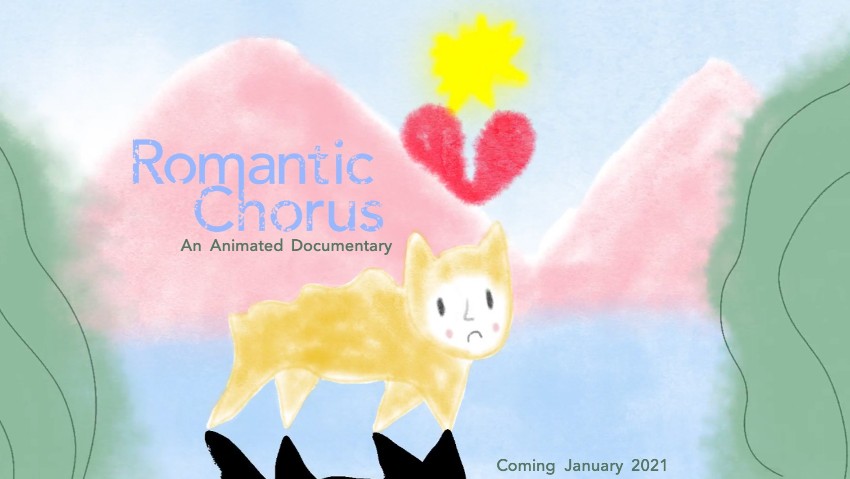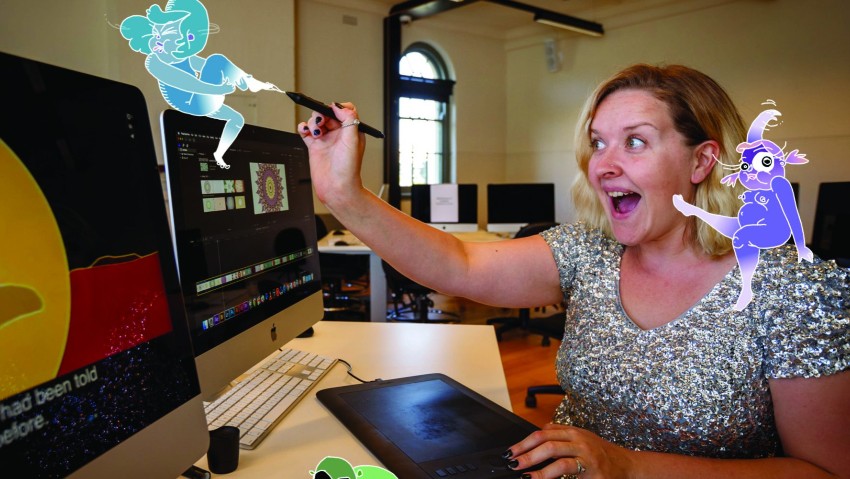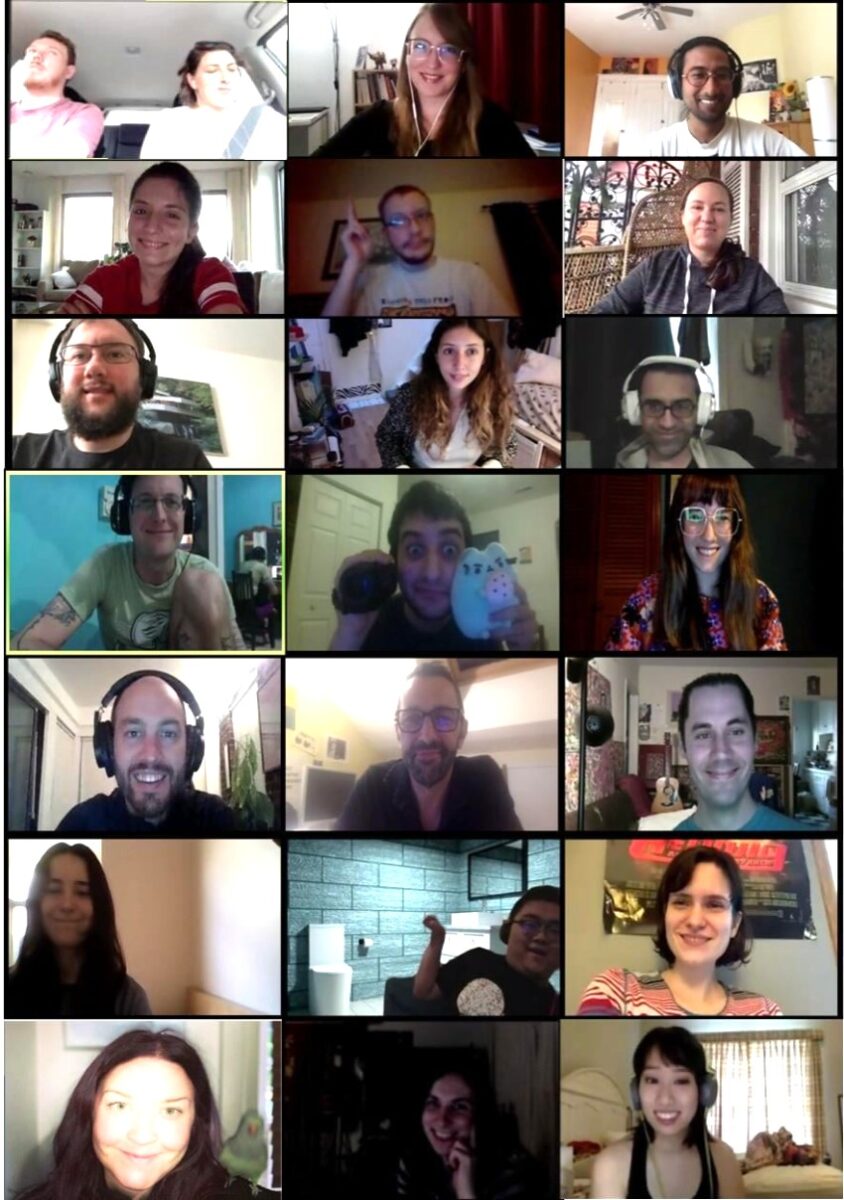
Annie Murray was in hospital 90% of the time until the age of about 17 years and to stave off boredom would continually draw and create stories that would take her out of my physical surroundings. These drawings took the form of panel cartoons and canvas paintings. Upon graduating from school, Annie was coerced into picking a career path by her family that would ‘make money’ and promptly took a gap year. Which lasted 10 years. Wherein, she found herself traveling the world and spending 8 years in Scotland. Annie returned to Australia at age 30 to pursue a degree in Animation – because she had always loved watching cartoons, telling stories and really, really wanted to see what her panel strips and paintings would be like when brought to life.
Annie Murray‘s advisor and teacher at University (VCA) Paul Fletcher was instrumental in supporting her to embrace her love of following her gut in art as well as building to her collaborative strengths. Annie believes the most interesting directions come from looking at your map and the happy mistakes along the way to the destination. Animation is the study of movement and capturing of the unseen moments – with strengths lying in both the ability to portray reality and step outside it. The perfect medium for analogy and metaphor. Paul also brought out the auteur in me and pushed me to learn all filmic techniques from foley creation, composing for film and TV, lighting, scriptwriting, direction to marketing, budgeting, and promotion.
Annie Murray’s industry value is best attributed to becoming Producer and Programmer for The Melbourne International Animation Festival which is entering its 21st year of screening over 400 films from around the world, annually. It is also the biggest window into emerging and Australia Indie animators. “I am also in a position to encourage and support up and coming animators which is such a very special place to be,” says Annie Murray
The official trailer for the Animated-Documentary “Romantic Chorus” by Jeff M. Giordano, Aaron Gwynn, and 17 animators featuring 21 interviews with music by Laurent Mathieu
indieactivity: Detail the day-to-day process of this film project working with your closest collaborator?
Annie Murray (AM): Procrastination – anxiety – coffee – movement. Rinse. Repeat.
Your work is critical in filmmaking! What were your tasks on this film project?
Annie Murray (AM): Draw a bunch of pictures in sequential order with incremental changes
Did you have to work with a team? Or did you go solo? Were you a 3D generalist on this project? Where do you jump in during most filmmaking pipelines?
AM: I was, I’m sure to the charging of my team and the directors, a lone wolf during this project. My process is windy and free- form as such I often don’t update people on my work. I had several projects on the go at the same time and was able to dedicate time to the project when able – which didn’t always coincide with team meetings or ZOOM calls. One of the best things about working on this project was the complete creative freedom. Which I embrace with both hands in between the sometimes constructive nature of pleasing clients with my freelance work.
What is your experience working on this story, screenplay, production, premiere, and marketing?
AM: Positive! The project was straightforward – select sections of the productions to animate and work to the audio.
Describe your work as an animator (non-traditional/digital) versus film/cinema digital and/or traditional filmmaking?
AM: It takes longer and I have RSI in my wrist? You’re only as limited as your imagination.
You must have donned several hats on this medium budget project, what measure of input: intellect, effort, tenacity, skill, does it take to put out all these qualities to get this project done?
AM: Animation is a time-consuming art form there is no getting around it. Coffee helps.

What about this independent film did you struggle with?
AM: Nothing
What would your role be if you had been in cinema collaborating with D. W. Griffith & Charlie Chaplin (silent film), Orson Welles & Alfred Hitchcock (film noir), and John Huston (Visual Artist) and or John Ford?
AM: Hitchcock. I’d be a bird trainer.
Lucas wanted his 1977 film Star Wars to include animation and built ILM. What is your plan with animation? Is it educational? Entrepreneurial? Both? What else?
AM: Both. I run workshops under the ABN Bigger Picture Animation which teaches animation to disadvantaged young people. As it is an art form, it has all the same value as any fine art.
The animation industry has come a long way from Disney (traditional cell animation) and Star Wars. Today it’s still driven by technology (software and hardware), take us through a short history of the industry progress from your view?
AM: We don’t have time. All you need to know is that 90% of animation out there is independently produced and consumed by very specific markets. Please look into festivals like Annecy, Zagreb, Animateka, LIAF, MIAF, Hiroshima, etc. Baltic animation is AMAZING. Estonian, particularly strange. I recommend work by Pritt Tender, Pritt Paarn, and Chintis Lundgren as a starting point.
ILM created the OpenEXR format and invented IMoCap. It runs the largest render farm; Death Star. How do animation companies finance, re-finance, and/or stay in the animation business? Do you think this film will trigger an industry-wide success? Is it feasible? Is it necessary?
AM: Not necessary.
The companionship of animation and filmmaking has spiked, do you think we are at a peak? If we are not, when do you think it will peak?
AM: It won’t – it will morph and change and grow.

Independent films benefit from low-end animation tools like After Effects, Blender, etc. Introduce us to more tools you work with within this sphere of filmmaking?
AM: TV Paint, Final Cut Pro, and VDMX.
Do you have a production company – what was the motivation for its formation?
AM: Bigger Picture Animation.
What was the first project out of the gate?
AM: My Companion Altzschmertz, Dear David, and Record Stores.
Where do you think your strengths lie as an animator?
AM: Flexibility and constant curiosity.
Do you think your work can sell a project? Often if the animation is done properly it goes unnoticed. How much media attention do you think animators artists need?
AM: All of it.
What else have you got in the works?
AM: A film for the Church of Metaphysics and a music film clip.
Annie Murray is an animated film director and creator. Her pieces draw strongly from autobiographical experiences with themes scrutinizing mental health whilst delivering humor with heart. Body horror is often used as a comedic device alongside an irreverent and absurdist aesthetic. She plans to keep making films that disappoint her mum for as long as she can. She was hatched from an egg on Uranus and there is nothing else remotely interesting about her.
Tell us what you think of the interview with Annie Murray What do you think of it? What ideas did you get? Do you have any suggestions? Or did it help you? Let’s have your comments below and/or on Facebook or Instagram! Or join me on Twitter.
Follow Annie Murray on Social Media
Website
LinkedIn
Facebook
Instagram
Vimeo
Richard Green Documentary, ‘I Know Catherine, The Log Lady’: Premiere in NYC, LA May 9th
Lynchian Doc I Know Catherine, The Log Lady Makes Hollywood Premiere 4/17, Rollout to Follow
In Camera by Naqqash Khlalid Launch on VOD April 29
Naqqash Khlalid’s Directs Nabhan Rizwan. In Camera stars an EE BAFTA Rising Star Award Nominee.
2025 Philip K. Dick Sci-Fi Film Festival Award Winners Announced
Vanessa Ly’s Memories of the Future Awarded Best PKD Feature
Dreaming of You by Jack McCafferty Debuts VOD & DVD for April Release
Freestyle Acquires “Dreaming of You” for April 15th Release
Hello Stranger by Paul Raschid set for London Games Festival & BIFFF
The film Is set for an April 10th Premiere at The Genesis Cinema in London (LGF) and BIFFF
Daydreamers Official Trailer by Timothy Linh Bui: Released by Dark Star Pictures
Daydreamers Vietnamese Vampire Thriller – May 2nd release









